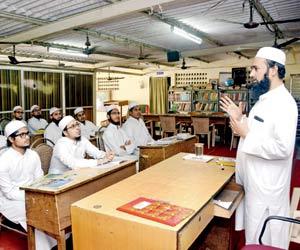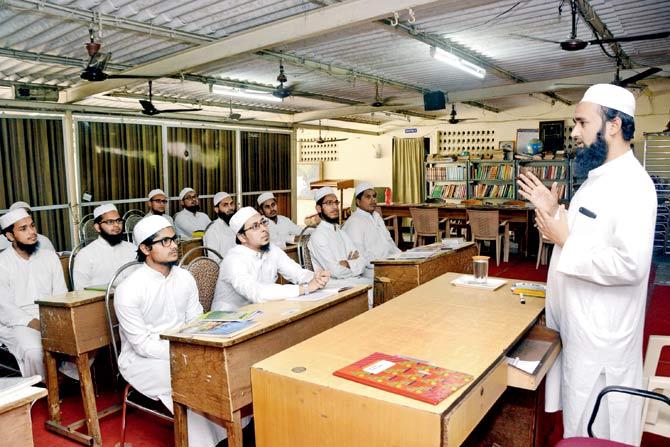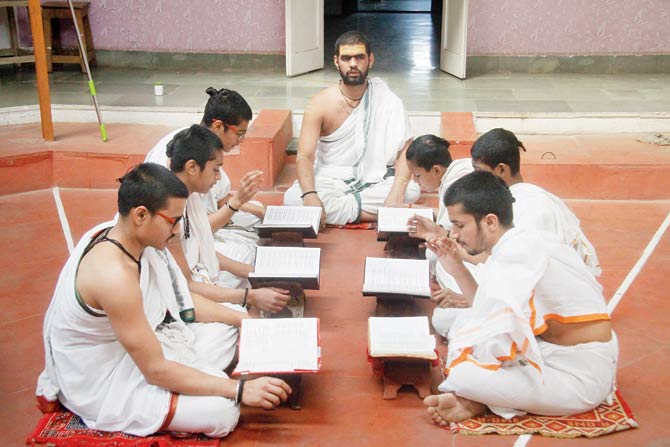As the Centre mulls terming students from madrassas and vedic pathshalas 'out-of-school children', those heading these institutions ask if there's any merit to the move


Students at Markazul Ma'arif Education Research Centre and Vedbhavan seem uncertain about their future after the Centre's suggestion to de-recognise their schools. Pics/Sneha Kharabe, Mandar Tannu
On A Saturday afternoon, the ground floor classroom at Markazul Ma'arif Education and Research Centre in Jogeshwari West is abuzz with students waiting for their essay and composition class to begin. Around six months ago, 30 madrassa-educated teenagers, between 18 and 21 years of age, hailing from states like Kerala, Jammu and Kashmir, Andhra Pradesh and Gujarat, made the cut from among 200 others to get an admission at this religious seminary.

The students, proficient in Islamic jurisprudence and history, are studying to become clerics. "Here, English is being taught to bridge the gap between tradition and modernity. This is to ease their transition into the mainstream," said M Burhanuddin Qasmi, director of the institution. The two-year course begins with grammar, before moving on to literature. "By the end of it, the boys will have read everything from William Shakespeare to Sadat Hasan Manto," Qasmi added.
But, the question to now ask is whether this learning will be of any use, especially after a recent government panel suggested that students studying in unrecognised schools, madrassas and vedic pathshalas might soon be deemed "out-of-school". The panel, headed by Upendra Kushwaha, HRD minister of state (school education), made the recommendation last month, while suggesting mapping of all unrecognised institutions during a survey to identify out-of-school children.
A lesson in tradition
Inside the classroom, the news about the panel suggestion has left students confused. "Does that mean we will be considered illiterate?" asked Mohammed Faheem, one of the students. Faheem hails from Rampur, Uttar Pradesh, and has graduated in Islamic jurisprudence from a local madrassa in Saharanpur. "Contrary to general perception, many subjects, including science, social sciences, and history are taught at madrassas, in addition to classical Islamic texts or deeni taleem," he said. But, the reason Faheem wants a diploma degree in English is so that he can go back to his native village and teach marginalised students. In fact, the Markaz centres with branches in Assam, Manipur, New Delhi, Deoband and Mumbai, was set up for this very reason by Moulana Badaruddin Ajmal in 1994. "Many of the students are now scholars, researchers and professors at esteemed universities in India and abroad," said Qasmi, debunking the notion that madrassas breed radicalism.
Through a curated syllabus, the madrassa aims to integrate Islamic theology with modern content to uplift economically backward Muslim students. The syllabus has been designed by Qasmi and other professors after selecting portions from the state education curriculum. One section even includes the works of Khushwant Singh, because sometimes "the irreverent is relevant".
Past forward
This is not the first time that the government has contemplated such a move. Three years ago, a similar row had ensued when the Maharashtra government was mulling on declaring madrassa students "out-of-school." The resurgence of this issue has left Muslim leaders and educators outraged.
A 2013 study by National Commission for Minority Educational Institution found that there are nearly 1,900 madrassas in Maharashtra imparting education to over 1.5 lakh students. If the state goes ahead with the plan, the lives of many bright, young minds would be in jeopardy, said Qasmi.
"Almost four per cent of Indian Muslims study in madrassas. The first education minister of independent India, Maulana Abul Kalam Azad, was a product of this institution. Would you call him out of school?" asked Obaidullah Qasmi, assistant professor at Zakir Hussain College, Delhi University, who also studied at a madrassa.
Mohammed Atiqur Rahman, whose three children study at a madrassa in Goregaon, said he never felt the need to enrol them at a regular school. "Madrassas are at par with mainstream schools. Along with religious education, they teach other subjects as well. My children are receiving the best of both worlds," said Rahman.
A vedic way of life
Around 25 km from the city, 15 students housed in a residential school situated on a two-acre land in the idyllic surroundings of Kothrud, near Pune, are learning the Vedas. The Vedbhavan was founded by Vedacharya Ghaisas and his son Moreshwar Vinayak in Pune in 1945. Here, the school operates on the lines of gurukuls, where students and teachers live and learn together. The boys join at the age of 12 and continue to stay here till they are 25 years old.
"By then, they have received basic education from a regular school. It is only after the initial screening for a few months that the potentially gifted kids are selected," said Moreshwar's son Vishweshwar, who teaches at the school. A typical day in the Vedbhavan begins at 4 am. The morning session is from 7 am to 12 noon, and includes surya namaskar. "We provide them with a Satvik diet. The boys are given responsibilities such as tending of vegetables and crops in the garden, looking after the cows in the dairy and cleaning the cow-sheds. By evening, they again resume their classes, and perform the evening sandhya karmas, which go on till sunset," he said. The students learn Vedic texts like Dashagranthas, Paddapathas, Karma Path, Jata and Ghanapatha in Sanskrit. "Many of our students go on to work as purohits or priests either in India or abroad, where they spread the knowledge of the texts," said Vishweshwar.
Future forward
The skill sets that students in both vedic pathshalas and madrassas acquire have a demand in certain sectors. Qasmi of Markazul Ma'arif Education said campus recruitments are common. "Every year, Muslim schools and colleges approach us when they need people to fill in as administrators, school teachers or professors. It's the same with Gulf companies. Many of our students work as translators because they are proficient in Arabic, English and Udru," he said.
Vishweshwar, too, is puzzled by the Centre's stand on the issue. "Can you guarantee that an MBA student will get a job? No. Then why are we questioning the efficacy of religious seminaries that are also imparting knowledge? It may not be mainstream, but it is helping students," he said. Qasmi added, "I think such a move will only leave the country red-faced. Our literacy rate will drop considerably."
Also read: 30 Madrassa Students In Bhiwandi Land In Hospital After Lunch Event
Catch up on all the latest Mumbai news, crime news, current affairs, and also a complete guide on Mumbai from food to things to do and events across the city here. Also download the new mid-day Android and iOS apps to get latest updates
 Subscribe today by clicking the link and stay updated with the latest news!" Click here!
Subscribe today by clicking the link and stay updated with the latest news!" Click here!









